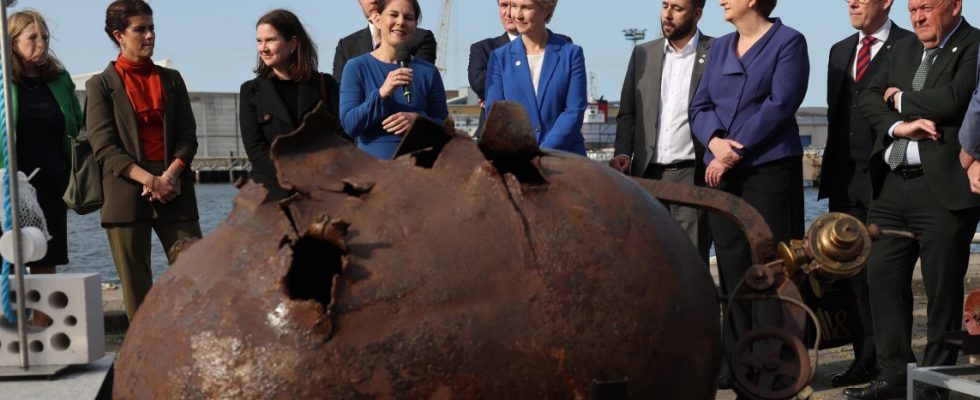Trust is important in international politics – that’s one of the lessons that Federal Foreign Minister Annalena Baerbock has learned from breaking with all certainties and rules that Russia’s attack on Ukraine means. “The trust that we placed in the partnership with Russia is gone,” she says. Sharing openly among allies is their means of dealing with this reality. That’s why she organized an informal meeting of NATO foreign ministers last year. That’s why she connected the Baltic Sea Council, which Germany currently chairs, directly to this year’s NATO meeting in Oslo.
If you know each other well, you can also achieve more politically together. And so Baerbock invited her colleagues from the neighboring countries of Denmark, Estonia, Finland, Lithuania, Latvia, Poland and Sweden as well as Iceland and Norway to travel with her in the plane from Norway to Rostock and on to Wismar. Over lobster or truffle risotto, the ministers were able to get a bird’s-eye view of the subject under discussion.
“The safety of each of us is the safety of all of us.”
Poland’s Foreign Minister Zbigniew Rau, who was represented by a state secretary in Wismar, had no desire for a school trip atmosphere and plane selfies – the election campaign is at home, and cooperation with Germany does not fit into the strategy of the ruling PiS party, which deals with confrontation courts votes. The Latvian foreign minister had to pass because he was unexpectedly elected president by parliament. And the Finn was absent because he was still visiting US Secretary of State Tony Blinken in Helsinki.
Selfie on the government plane (clockwise from left): Annalena Baerbock with Tobias Billström (Sweden), Andris Pelšs (Estonia), Lars Løkke Rasmussen (Denmark), Thórdís Gylfadóttir (Iceland) and Gabrielius Landsbergis (Lithuania).
(Photo: Federal Foreign Office)
Russia’s attack on Ukraine also plunged the Council of the Baltic Sea States, which German Foreign Minister Hans-Dietrich Genscher helped initiate in 1992, into a crisis. It was an “optimistic time in the region” back then, says Norway’s Foreign Minister Anniken Huitfeldt. Last year, on the other hand, they considered whether the forum still made sense, adds Baerbock – fortunately, the decision was made to further intensify the cooperation. Russia left in May 2022 after its membership was suspended. Until the war, the Council was one of the few remaining rounds in which concrete cooperation on specialist issues was possible.
The security situation is the background of all consultations, says Huitfeldt. “The safety of each one of us is the safety of all of us – especially here in the Baltic Sea region,” says Baerbock. World politics is reflected in the waters of the Baltic Sea, unfortunately far too often in gloomy colors. Examples from the past were lined up on the quay wall of the old port in Wismar when the ministers arrived Thursday afternoon: rusted shells from sea mines, aerial bombs, grenades – remnants of the two world wars and ammunition that was simply dumped in the Baltic Sea, including phosphorus shells.
400,000 tons of ammunition and about 40,000 tons of chemical warfare agents
According to estimates by the Fraunhofer Institute for Graphic Data Processing, up to 400,000 tons of conventional ammunition and around 40,000 tons of chemical warfare agents lie on the seabed between the Flensburg Fjord and the Gulf of Bothnia. The countries want to work together more closely to recover these “dangerous traces of the past”, create a complete register of the sites and exchange information, jointly develop technologies such as diving robots or databases.
The ammunition poses a risk to people and the environment, shipping is just as endangered as undersea cables, said Baerbock. Many of the mines are still active today, the detonators still work more than 75 years later, and the explosives detonate. Ammunition that rusts through, in turn, releases toxic chemicals that enter the food chain. The federal government has launched an emergency program with 100 million euros, but that can only be a start, says the foreign minister.
Clearing the munitions is often a prerequisite for other projects that you want to promote together: the construction of offshore wind farms. Electricity generation in the Baltic Sea is to be increased sevenfold by 2030, Baerbock announced on Friday in Wismar. Old mines can be found up to four meters deep in the sediment, which divers have to laboriously identify in order to render them harmless if the Baltic Sea is to be transformed into a “giant blue power plant,” as Baerbock puts it. The advantage: the project developers should contribute to the costs of the clearance, as in the case of ammunition finds on land.

